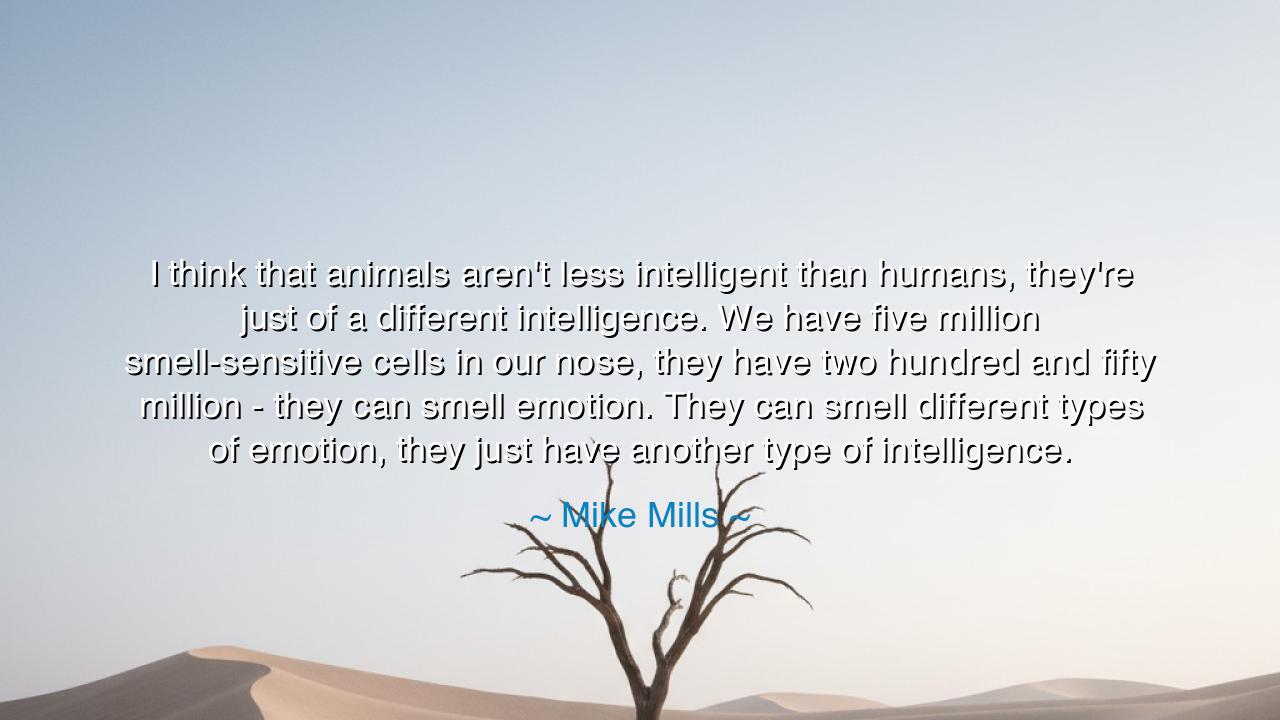
I think that animals aren't less intelligent than humans, they're
I think that animals aren't less intelligent than humans, they're just of a different intelligence. We have five million smell-sensitive cells in our nose, they have two hundred and fifty million - they can smell emotion. They can smell different types of emotion, they just have another type of intelligence.






When Mike Mills said, “I think that animals aren't less intelligent than humans, they're just of a different intelligence. We have five million smell-sensitive cells in our nose, they have two hundred and fifty million — they can smell emotion. They can smell different types of emotion, they just have another type of intelligence,” he was speaking not merely of animals, but of the sacred diversity of creation. In these words, Mills challenges humanity’s oldest illusion — the belief that intellect is singular, that to think differently is to think less. His insight invites us to see intelligence not as a ladder with man at the top, but as a vast web of consciousness, each creature holding its own wisdom, each soul perceiving the world through its own divine design.
The origin of this reflection arises from Mills’ deep observation of life — the artist’s eye turned not only upon humans, but upon the silent sentience that moves in all living things. In studying animals, he saw a truth often forgotten by humankind: that the mind is not measured by words or inventions, but by the harmony between a being and its world. Animals live not by reason but by instinct, and yet their instincts are a kind of brilliance — a wordless intelligence that allows them to read the earth, the sky, and even the hearts of others. Where we analyze, they sense. Where we question, they know. It is a different form of knowing, but it is knowing all the same.
Ancient wisdom understood this well. The indigenous peoples of every land saw animal intelligence as sacred — the wolf, master of loyalty and perception; the owl, keeper of insight; the elephant, symbol of memory and empathy. The philosophers of Greece, too, pondered the natural order of reason and instinct. Pythagoras himself believed that all creatures shared the same essence of life and that to harm an animal was to wound the cosmos. They knew what the modern world often forgets — that intelligence wears many faces, and that wisdom does not belong to mankind alone. Mills, in his modern voice, echoes these ancient truths: that what we call “different” may only be “deeper” in a way we cannot yet understand.
When Mills speaks of dogs and their two hundred and fifty million smell-sensitive cells, he reminds us that what we call “emotion” — love, fear, grief, hope — is not invisible to them. They do not hear our words, yet they read the symphony of our hearts through scent and vibration. A dog can smell sadness before tears fall, can sense joy before we speak. Science calls it olfactory sensitivity, but the soul recognizes it as empathy in another form. What humans accomplish through intellect, animals perform through intuition. Where we reason our way toward compassion, they feel their way into it. That is not lesser intelligence — it is a different kind of genius.
History offers many witnesses to this truth. The story is told of Alexander the Great and his horse Bucephalus, a creature no man could tame. The young Alexander noticed that the horse was not wild, but frightened of its shadow. Turning its head toward the sun, he calmed the animal and mounted him with ease. In that moment, Alexander did not overpower the horse — he understood it. He recognized that wisdom can only emerge through respect for another’s way of perceiving. It was not strength that made the conqueror great, but his recognition of intelligence beyond his own. So too, Mills teaches us that the world is full of such minds — silent, instinctive, radiant with perception.
From this truth arises a greater teaching: to be wise is to listen beyond words. If we would live in harmony with the world, we must learn from all its voices — not only from books or human tongues, but from the movements of birds, the patience of trees, the loyalty of dogs. Each creature embodies a lesson written in the language of its senses. The hawk teaches clarity of sight; the ant, the power of labor; the dolphin, the joy of play. These are not metaphors alone — they are forms of intelligence, different but divine. To see them as lesser is to blind oneself to the fullness of creation.
So, my child, remember this: humility is the first mark of true intelligence. Do not measure wisdom by human standards alone. Instead, look to the natural world and learn its ways. Sit beside your dog and sense what it feels, watch the bird and notice how it reads the wind. In doing so, you will glimpse the unity of all life — that the universe does not think in one voice, but in many. As Mike Mills reminds us, the gift of humanity is not to dominate other forms of intelligence, but to recognize and revere them. For when we honor the intelligence of the earth and its creatures, we remember the oldest truth of all: that all minds, human or otherwise, are but reflections of the same infinite consciousness that gave birth to life itself.






AAdministratorAdministrator
Welcome, honored guests. Please leave a comment, we will respond soon